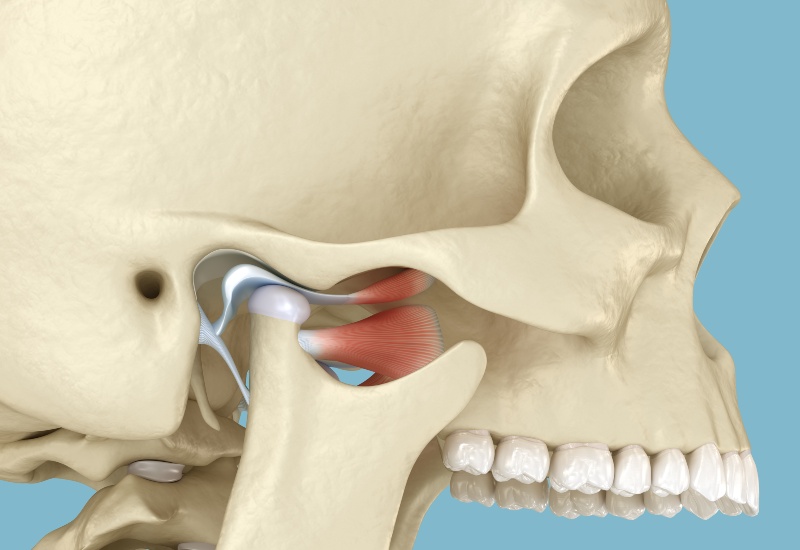TMJ Treatment
Temporo-Mandibular Joint Dysfunction Treatment in Castle Rock, CO
Tens of millions of adults nationwide suffer from TMJ disorder. Castle Rock Ear Associates doctors are committed to providing thoughtful TMJ treatments for Castle Rock, CO and Douglas County patients. Our compassionate team understands how disruptive TMJ disorder can be to your life and works with you to provide immediate relief and long-term results. We utilize the latest technology to make accurate and precise diagnoses and improve patient outcomes. Learn more about TMJ and contact our office today to schedule your initial consultation.

What Is Temporo-Mandibular Joint Dysfunction?
The temporo-mandibular joint connects your lower jaw to your skull, specifically at the temporal bone in front of your ear on each side of your head. The joint is used daily to talk, chew, yawn, and perform other essential jaw motions. As one of the most frequently used and complex joints in the body, it plays a crucial role in your everyday life. Stress, bruxism, and degenerative diseases can all lead to TMJ dysfunction, significantly impacting your quality of life.
What Are Common TMJ Symptoms?
Every patient is unique, and their symptoms can vary from mild to severe depending on numerous factors, including how long they’ve been experiencing TMJ dysfunction. Recognizing the symptoms early on is crucial to reduce further pain, improve treatment outcomes, and increase their overall quality of life. Speak to our doctors today if you’re experiencing any of these symptoms:
- Jaw Pain or Tenderness Around the Joint
- Difficulty or Discomfort While Chewing
- Clicking or Popping Noises When Opening or Closing Your Mouth
- Stiffness or Limited Jaw Range
- Teeth Clenching or Grinding
- Facial Swelling Around the Jaw
- Lockjaw
What Are the Main Causes of Temporo-Mandibular Joint Disorder?
The cause of Temporo-Mandibular Joint Disorder is varied and still not entirely understood. However, there are numerous factors contributing to a patient’s increased likelihood of suffering from TMJ disorder. Understanding these factors allows patients to act quickly and decisively when seeking treatment. If you’ve experienced any of these issues, you may be at higher risk of experiencing TMJ disorder:
- Arthritis – Osteoarthritis and rheumatoid arthritis can wear down the joint, leading to inflammation and pain.
- Bruxism – Clenching the jaw or teeth grinding can put excessive pressure on the joint, causing pain and discomfort.
- Jaw Injury – A jaw injury can damage cartilage, lead to misalignment, and cause inflammation, all of which can impair the joint’s function.
- Habitual Gum Chewing – Overworking the jaw muscles places unnecessary strain and causes more rapid deterioration of the joints.
- Stress – Stress can trigger habits like teeth clenching or grinding (bruxism), which put excessive pressure on the temporo-mandibular joint.
What Treatments are Available for TMJ Disorder?
When you choose Castle Rock Ear Associates for TMJ treatment, we follow a comprehensive process to diagnose and treat your TMJ disorder accurately. We take the time to identify the symptoms, habits, or prior injuries that may be contributing to your issues. Next, we’ll perform an examination, which may include asking you to open and close your jaw and palpating the area to check for tenderness, pain, popping noises, and to assess the range of motion. Depending on our diagnosis, we may recommend one of the following treatments:
- Medication – Your doctor may prescribe medication to alleviate pain and ease inflammation.
- Non-Surgical – Non-surgical options include resting, jaw exercises, lifestyle changes, or a nighttime mouth guard.
- Surgical – In some rare instances, surgery may be recommended if all other options have been exhausted.
How Can I Prevent TMJ Pain?
While the cause of TMJ disorder is diverse and not well understood, there are a few ways in which you can prevent pain caused by TMJ dysfunction. Implementing these simple, yet effective tips can reduce the chance of TMJ dysfunction or help alleviate its symptoms before worsening:
- Avoid Overusing Your Jaw
- Manage Stress
- Use a Nighttime Mouthguard
- Stay Hydrated
- Schedule Routine Checkups
Personalized Treatment to Provide You With Relief
Patients throughout Castle Rock, CO and Douglas County trust Castle Rock Ear Associates for TMJ dysfunction diagnosis and treatment. Our team uses the latest diagnostic technology for accurate assessment and effective treatments. TMJ is a common, but manageable, condition. Identifying the signs and symptoms early on can help our team provide you with long-lasting relief. Whether you require rest, medication, or oral surgery, we can recommend the right treatment. If you’re experiencing pain in your jaw, contact our team to schedule your appointment.
